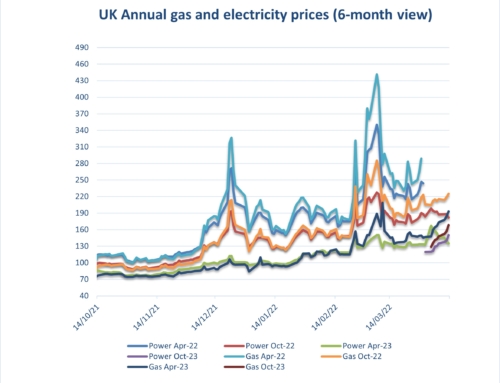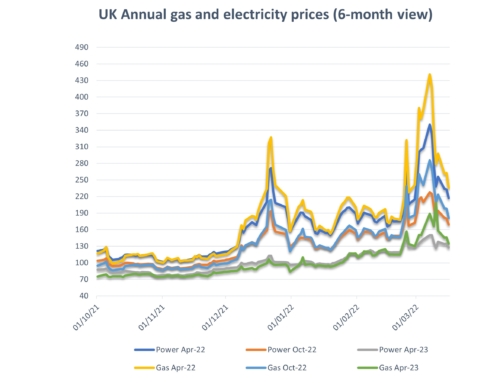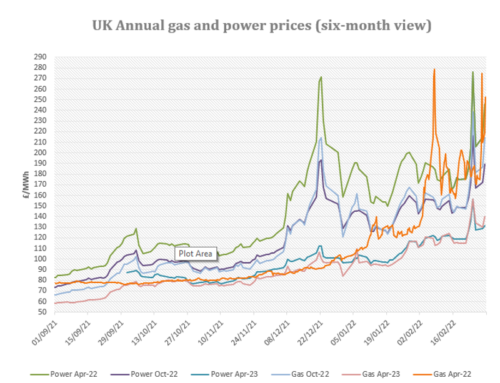Energy costs: Gas and electricity markets have reduced in the second half of October due to further strengthening GBP, high wind generation, strong European gas storage outlook and a high amount of LNG inflows into the UK grid as Europe’s storage of gas is at 98%. It is predicted for temperatures and wind generation to dip below seasonal norms over the next two weeks which could make prices volatile but expecting to increase again into December and experience a mild Winter.
Upside:
Maintenance –There have been unplanned Norwegian outages and restarting the reactors at Dungeness nuclear plant has been delayed until the end of January.
Coal/Oil markets – Prices have been volatile over the last fortnight. This is likely to continue with the ongoing trade talks between US and China and further talks with OPEC nations.
Temperatures – Forecasters are predicting temperatures below seasonal norm for the next two weeks but is predicting for this to increase again in the latter part of November.
Downside:
Gas storage – This remains significantly high at 98% across Europe with no indication of this diminishing during Winter.
LNG deliveries – We are receiving a large number of LNG deliveries due to Europe’s storage being full.
Could go either way:
Brexit/Sterling – Until an agreement is reached over Brexit, this will remain an area of significant risk. If the UK crashes out, Sterling devaluation will amplify any increases in fuel markets.
Carbon (CO2) markets – Prices have remained below recent resistance levels since the beginning of the month. However, we did see a big hike in prices at the end of April, when a no-deal Brexit previously seemed imminent.
Wind output – Wind generation is expected to dip over the next couple of weeks but is predicted to increase again after this period.
Non-energy costs: On the electricity side organisations will see further increases in pass through costs from both government and industry infrastructure providers in the coming months as distribution, Electricity Market Reform (EMR),Capacity Market and Energy Intensive Industries (EII) charges are ramped up.
Climate change levy (CCL) increased significantly from April 1st to offset the loss of CRC to Government revenues. Please see the attached pass through charge information for details. Your CCA related CCL exemption rates will increase at the same time (Gas 78%, Electricity 93%). Please ensure your PP11 forms are updated and sent through.
Warning: more gas suppliers are passing through backdated Un-identified Gas (UIG) charges for 2017/18. Please contact us if you have any questions or unusual gas bills.
Is your organisation covered by the new Streamlined Energy and Carbon Reporting (SECR) scheme?
Designed to replace in part the Carbon Reduction Commitment (CRC) which ends this year and to follow on from the energy savings recommendations generated by ESOS compliance. Note, SECR will cover a wider scope of organisations than CRC and ESOS do. Full details are attached below.
SECR will require all large enterprises to disclose within their annual financial filing obligations to Companies House, their greenhouse gas emissions, energy usage (from gas, electricity and transportation as a minimum), energy efficiency actions and progress against at least one intensity ratio.
The scheme came into effect on April 1st, 2019 and will be required to be included in the first set of accounts published for financial years starting after this date.
The scheme covers publicly quoted companies (extending their current disclosure requirements) and UK incorporated companies or LLPs with two or more of the following.
- More than 250 employees
- A turnover in excess of £36 million
- A balance sheet in excess of £18 million.
UK subsidiaries, who meet the eligibility criteria, but are covered by a parent group’s report (unless the parent group is registered outside the UK) and companies using less than 40,000 kWh of energy during the reporting year do not have to provide disclosure. Note the reporting year should be aligned to your financial year.
Are you eligible for an EII rebate?
Under current rules, if you qualify at an industry sector level and your business passes the 20% electricity intensity test you may qualify for exemption to CFD and RO charges. Please see the attached Government RO/CFD guidance document and give me a call to discuss this further.
A copy of our detailed market report is available: Eneco Market Information early November 2019
Gas and electricity prices from 2009 to date are available here: Eneco Gas and Electricity Pricing Trends Sept 2009 to early Nov 2019
A copy of our environmental charges and Climate Change Levy rates from 2012 to date: Environmental Pass Through Charges and CCL ppkWh Updated 05.11.19
A copy of RO/CFD guidance document: RO_CFD_Guidance_Revised_July_2018
SECR: SECR EA Guidelines




